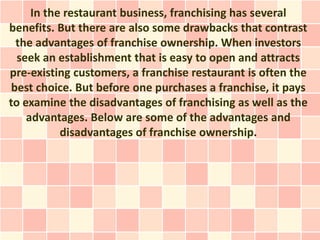
Restaurant Franchising: Advantages and Disadvantages
- 1. In the restaurant business, franchising has several benefits. But there are also some drawbacks that contrast the advantages of franchise ownership. When investors seek an establishment that is easy to open and attracts pre-existing customers, a franchise restaurant is often the best choice. But before one purchases a franchise, it pays to examine the disadvantages of franchising as well as the advantages. Below are some of the advantages and disadvantages of franchise ownership.
- 2. Advantage: Easier to receive business financing
- 3. Receiving business financing for independent eateries can be difficult for three reasons: their originality can make it difficult to assess their revenue potential, they have a higher failure rate than corporate eateries, and they don't have the financial backing of a corporation or business group.
- 4. Conversely, getting business financing for franchises tends to be easy for three reasons: the performance of the organization's existing locations demonstrates revenue potential, pre-existing customers are often present due to the organization's other locations, and corporate backing supports each new location.
- 5. Disadvantage: High purchase price
- 6. Restaurants that have corporate backing and high revenue potential usually cost more than independent establishments. In the case of elite franchises such as McDonalds, the price for a single location could reach a high seven-figure mark. Nevertheless, the consistently high income offered by such franchises makes them an excellent long-term investment.
- 7. Advantage: Access to elite marketing materials
- 8. Developing elite marketing materials requires time, human resources, and money. For independent restaurants, these things are usually at a premium, especially in their first year of operation. Corporate restaurants, on the other hand, have access to marketing materials available through their corporate office's marketing department. Among franchising advantages and disadvantages, access to elite marketing materials is one of the top advantages.
- 9. Disadvantage: High employee turnover
- 10. Most franchises offer their workers a low hourly wage in keeping with national pay averages for non-skilled workers. Consequently, the workers view their jobs as temporary and disposable. When new opportunities arise, they quickly leave or reduce their hours. For franchise managers, this means that the hiring process experiences temporary pauses, but never concludes. Employee turnover is lower among workers who receive part of their pay through customer tips.
- 11. Advantage: Excellent resale value
- 12. Due to their consistent income, well-defined customer base, and access to corporate support, most franchises command a high sale price, one that often only attracts seasoned investors who have deep pockets. In many cases, franchisees sell their restaurants for significantly more than they paid for them, especially after owning them long-term.
- 13. Before buying a restaurant, be informed
- 14. Buying a restaurant is a serious investment decision, one that should be preceded by careful examination of the benefits and drawbacks of owning a particular type of establishment. The benefits of owning a franchise include: the ease of receiving business financing, access to elite marketing materials, and excellent resale value. The drawbacks of owning one include high purchase price and high employee turnover. Prior to making a buying decision, investors should consult a commercial realtor who has experience in selling restaurants.
- 15. http://rangerwebconsulting.com/small-business- solutions-for-local-restaurant-owners//